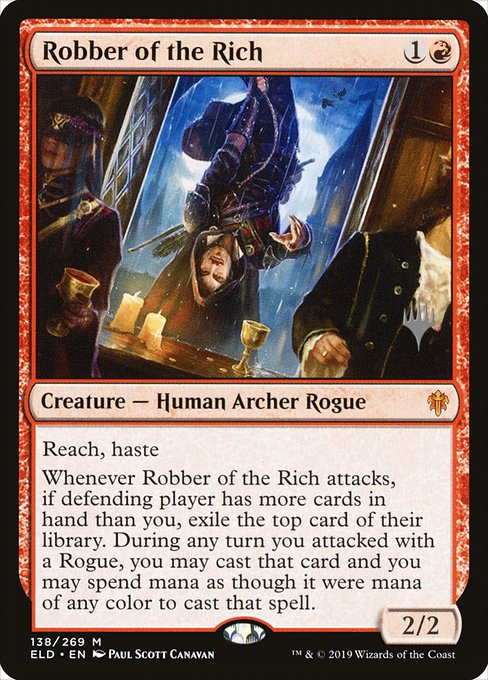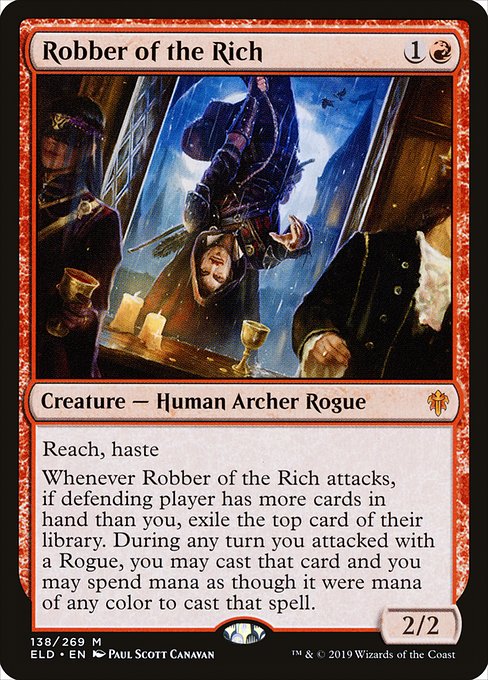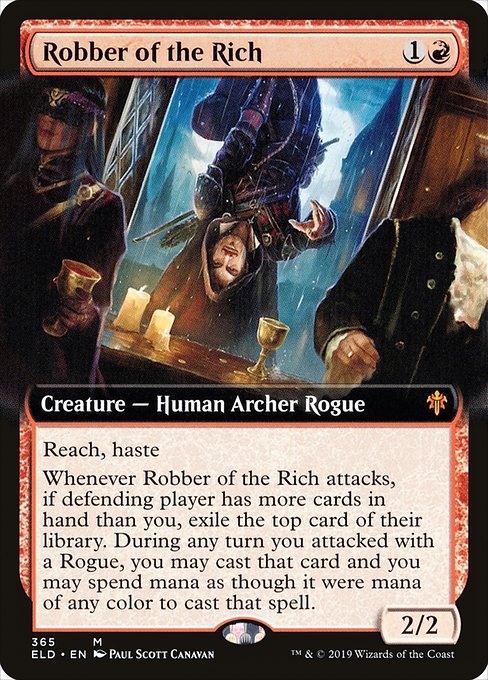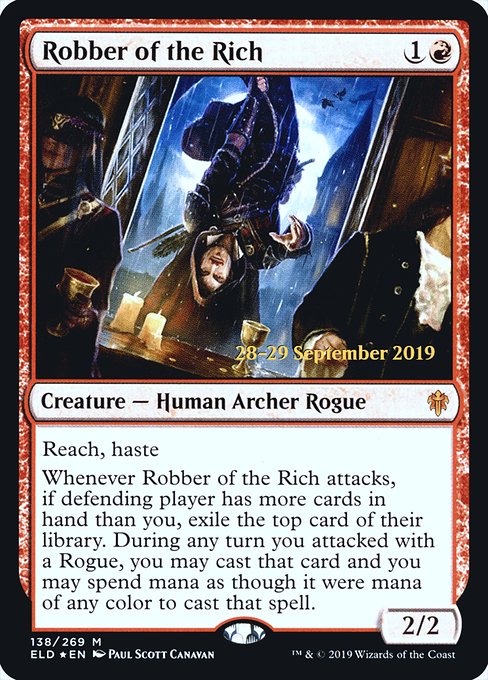standard
future
historic
gladiator
pioneer
explorer
modern
legacy
pauper
vintage
penny
commander
brawl
alchemy
paupercommander
duel
oldschool
premodern
Rulings
In a multiplayer game, if a player leaves the game, all cards that player owns leave as well. If you leave the game, any spells and/or permanents you control from Robber of the Rich's effect are exiled.
If the defending player doesn't have more cards in hand than you immediately after Robber of the Rich attacks, its ability doesn't trigger at all. If that player doesn't have more cards in hand as the ability resolves, the ability does nothing. It doesn't matter if that player has fewer or the same number of cards in hand in between these two times, or if they have fewer or the same number of cards in hand later.
The card Robber of the Rich exiles is exiled face up.
You can cast the exiled card if the Rogue that attacked is still in combat, if it's left combat, if it's left the battlefield, or even if combat is over.
If you cast an Adventure with Robber of the Rich, it's you, not the card's owner, who may cast the creature later.
If Robber of the Rich leaves the battlefield, the effect allowing you to cast the exiled card if you attacked with a Rogue continues to apply, even during later turns—as long as you attack with a Rogue during those later turns.
Robber of the Rich's effect doesn't change when you can cast the exiled card. For example, if you exile a sorcery card, you can cast it only during your main phase when the stack is empty.
An effect that instructs you to “cast” a card doesn't allow you to play lands.
Casting an exiled card causes it to leave exile. You can't cast it multiple times.
If a creature is attacking a planeswalker, the controller of the planeswalker is the defending player.
If the defending player doesn't have more cards in hand than you immediately after Robber of the Rich attacks, its ability doesn't trigger at all. If that player doesn't have more cards in hand as the ability resolves, the ability does nothing. It doesn't matter if that player has fewer or the same number of cards in hand in between these two times, or if they have fewer or the same number of cards in hand later.
The card Robber of the Rich exiles is exiled face up.
You can cast the exiled card if the Rogue that attacked is still in combat, if it's left combat, if it's left the battlefield, or even if combat is over.
If you cast an Adventure with Robber of the Rich, it's you, not the card's owner, who may cast the creature later.
If Robber of the Rich leaves the battlefield, the effect allowing you to cast the exiled card if you attacked with a Rogue continues to apply, even during later turns—as long as you attack with a Rogue during those later turns.
Robber of the Rich's effect doesn't change when you can cast the exiled card. For example, if you exile a sorcery card, you can cast it only during your main phase when the stack is empty.
An effect that instructs you to “cast” a card doesn't allow you to play lands.
Casting an exiled card causes it to leave exile. You can't cast it multiple times.
If a creature is attacking a planeswalker, the controller of the planeswalker is the defending player.
Rulings
In a multiplayer game, if a player leaves the game, all cards that player owns leave as well. If you leave the game, any spells and/or permanents you control from Robber of the Rich's effect are exiled.
If the defending player doesn't have more cards in hand than you immediately after Robber of the Rich attacks, its ability doesn't trigger at all. If that player doesn't have more cards in hand as the ability resolves, the ability does nothing. It doesn't matter if that player has fewer or the same number of cards in hand in between these two times, or if they have fewer or the same number of cards in hand later.
The card Robber of the Rich exiles is exiled face up.
You can cast the exiled card if the Rogue that attacked is still in combat, if it's left combat, if it's left the battlefield, or even if combat is over.
If you cast an Adventure with Robber of the Rich, it's you, not the card's owner, who may cast the creature later.
If Robber of the Rich leaves the battlefield, the effect allowing you to cast the exiled card if you attacked with a Rogue continues to apply, even during later turns—as long as you attack with a Rogue during those later turns.
Robber of the Rich's effect doesn't change when you can cast the exiled card. For example, if you exile a sorcery card, you can cast it only during your main phase when the stack is empty.
An effect that instructs you to “cast” a card doesn't allow you to play lands.
Casting an exiled card causes it to leave exile. You can't cast it multiple times.
If a creature is attacking a planeswalker, the controller of the planeswalker is the defending player.
If the defending player doesn't have more cards in hand than you immediately after Robber of the Rich attacks, its ability doesn't trigger at all. If that player doesn't have more cards in hand as the ability resolves, the ability does nothing. It doesn't matter if that player has fewer or the same number of cards in hand in between these two times, or if they have fewer or the same number of cards in hand later.
The card Robber of the Rich exiles is exiled face up.
You can cast the exiled card if the Rogue that attacked is still in combat, if it's left combat, if it's left the battlefield, or even if combat is over.
If you cast an Adventure with Robber of the Rich, it's you, not the card's owner, who may cast the creature later.
If Robber of the Rich leaves the battlefield, the effect allowing you to cast the exiled card if you attacked with a Rogue continues to apply, even during later turns—as long as you attack with a Rogue during those later turns.
Robber of the Rich's effect doesn't change when you can cast the exiled card. For example, if you exile a sorcery card, you can cast it only during your main phase when the stack is empty.
An effect that instructs you to “cast” a card doesn't allow you to play lands.
Casting an exiled card causes it to leave exile. You can't cast it multiple times.
If a creature is attacking a planeswalker, the controller of the planeswalker is the defending player.
Votre collection ? vos decks ?
Envie de gérer votre collection et/ou créer des decks ?



 0
0
 1.81€
1.81€

